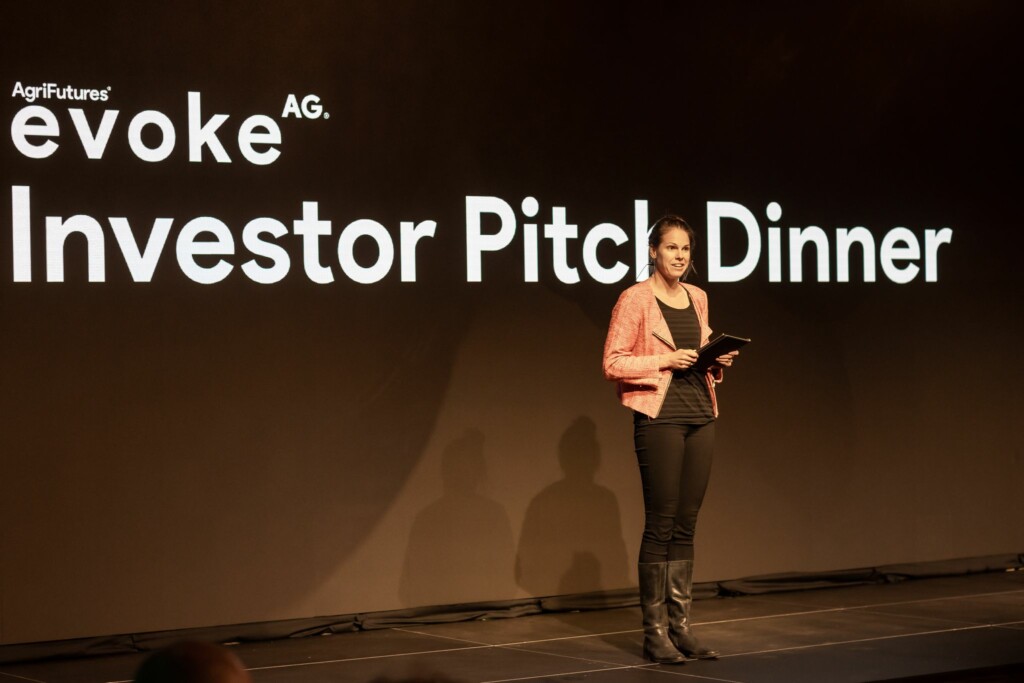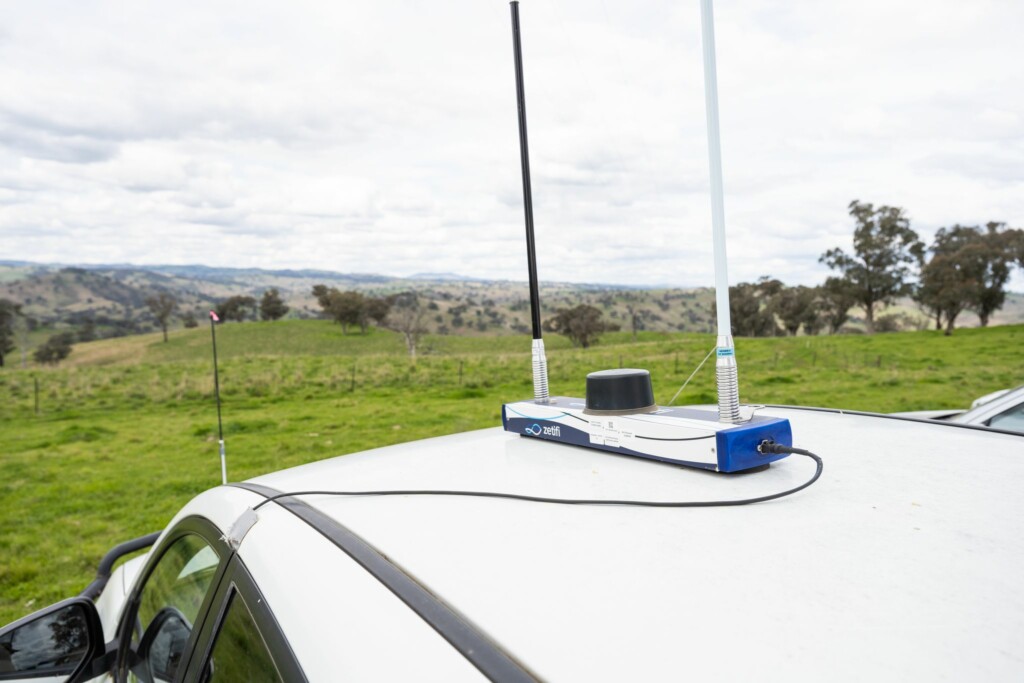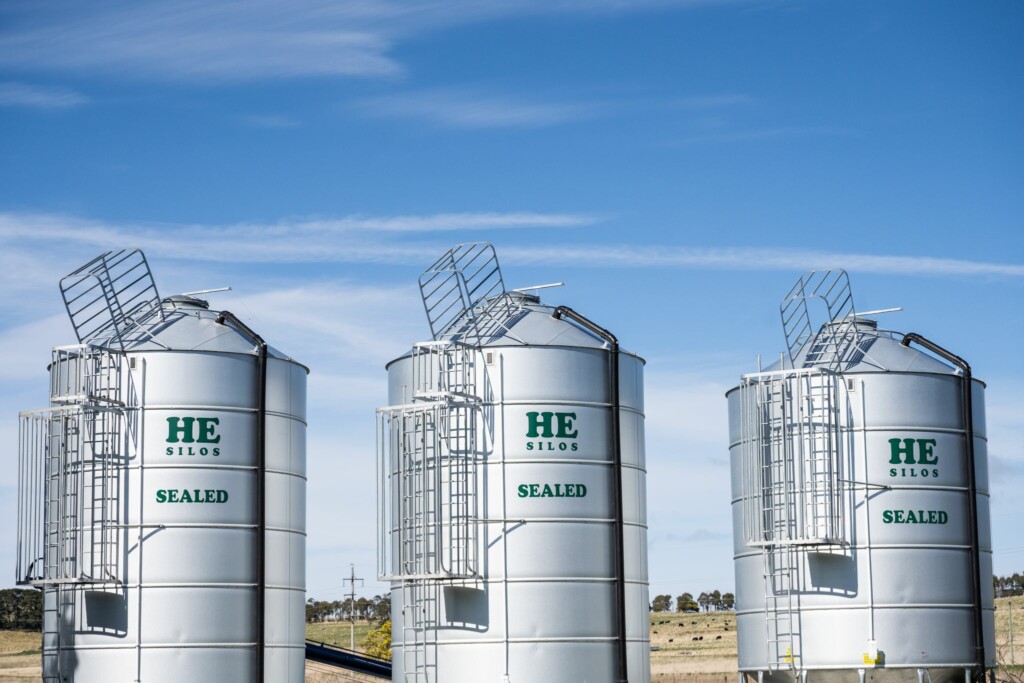Australian agritech has ‘arrived on world stage’
As the MC for evokeAG.’s second Investor Pitch Dinner, Tenacious Ventures’ Sarah Nolet remarked on how much things had changed since the previous evokeAG. in 2020 and its first Investor Pitch Dinner. Australian agritech has gone from aspiring to be a global player, Sarah says, to ‘fully established, proving to the world that we’ve arrived and we’re here to stay’. So where are Australia’s areas of global advantage, and what’s the key to maximising the future for the agrifood tech ecosystem?
 Andrew and Jocie Bate, Co-Founders of SwarmFarm with Sarah Nolet, Co-Founder and General Partner of Tenacious Ventures.
Andrew and Jocie Bate, Co-Founders of SwarmFarm with Sarah Nolet, Co-Founder and General Partner of Tenacious Ventures.
As Co-Founder and General Partner of Tenacious Ventures one of the leading agrifood tech venture capitalist (VC) funds, Sarah Nolet has seen firsthand the increasing momentum of Australian agritech in recent years.
“We’ve come from a niche sub-sector to what is now a mainstream area of interest, to the extent that most VC funds have at least one agritech company in their portfolio,” said Sarah.
“The first evokeAG. Investor dinner in 2020 was a really big moment for Tenacious Ventures. Our team had just hit the close on our first fund and were able to get up on the stage and announce we were becoming investors as a dedicated agrifood tech venture capital firm,” said Sarah.

Sarah Nolet MC at evokeAG.‘s 2022 Investor Pitch Dinner at The Grounds of Alexandria
Since then the Tenacious Ventures portfolio has grown to 11 companies, and the VC is now raising $70 million for Fund II to invest in early-stage agrifood tech startups at the intersection of climate impact and digitally native agriculture.
RELATED: Tenacious Ventures is raising $70 million fund for global agrifood innovation
More broadly the ecosystem is experiencing a higher volume of quality startups – partially because of new talent in the ecosystem – as well as what Sarah describes as ‘corporates and government paying attention.’
Two corporates paying attention are GrainCorp and motoring association NRMA. Earlier this year GrainCorp launched GrainCorp Ventures, a $30 million corporate VC fund with Artesian Venture Partners, that has agrifood tech at its core, and in June 2022 NRMA announced its foray into agrifood tech innovation as the cornerstone investor backing Mandalay Venture Partners’ sustainability-focused agriculture and food technology Fund I.
While the future looks bright, Sarah acknowledges the seriousness of the sector’s challenges and the importance of looking at these challenges from a macro level.
“We could not have more important challenges ahead to tackle, from unlocking agriculture’s potential for climate solutions and food security to demonstrating that agritech is a sector with serious staying power, regardless of market conditions,” said Sarah.
‘Keys’ to turn momentum into impact
Sarah sees three ‘keys’ for turning this momentum into impact for Australian entrepreneurs, investors and their customers in agriculture.
“Firstly, continued connectivity and collaboration, both within Australia and overseas, to ensure we have downstream investors who have deeper pools of capital to fund later-stages of startup growth,” she said.
“Second, we must double-down on the unique strengths of Australia, including our world-renowned research ecosystem, innovative and highly commercial primary producers, and the reputation Australian agritech founders have for really understanding the industries in which they operate.
“And finally, we need to capitalise on the macro-opportunities to ensure we’re solving global problems, starting locally. For Tenacious Ventures, climate change is front of mind. We believe that agrifood tech entrepreneurs are uniquely well-placed to deliver both impact and returns, helping agricultural value chains to decarbonise as well as unlocking sustainability solutions for other sectors of the economy.
“We have our work cut out for us. And if there’s anything we’ve learned, it’s that it takes an ecosystem,” Sarah added.
A maturing industry
Alongside Tenacious Ventures, GrainInnovate Fund, the fund established by the Grains Research and Development Corporation (GRDC) in partnership with Artesian Venture Partners, is playing a leading role in driving this momentum and supporting the maturation of ecosystem.
Echoing Sarah’s sentiment, GRDC’s head of Business Development and Commercialisation and GrainInnovate’s Investment Committee Member, Fernando Felquer says it’s a good time to be an agritech startup in Australia.
“Four or five years ago there were no dedicated VC investors for agritech in Australia. We now have multiple funds including GrainInnovate, Tenacious Ventures, and more recently GrainCorp Ventures joining the ecosystem. It’s been good to see corporates become more engaged about investing in agtech.”
“And it is not just about VC funds, the whole ecosystem has grown and matured with accelerator/incubator program providers and initiatives such as growAG. that are creating significant value for end users and innovators.”

Fernando Felquer GRDC and Jocie Bate, SwarmFarm at the evokeAG. 2022 Investor Pitch Dinner at The Grounds of Alexandria.
At the evokeAG. Investor Pitch Dinner in June 2022 Fernando was ‘super impressed’ with how much companies had matured over the past two years.
RELATED: Onside’s Series A launches at evokeAG. 2022 Investor Dinner
“It was great to see the quality of this year’s presentations, the level of understanding of the issues the startups were trying to address, the way they pitched and explained their approach to solving the issues producers and the ag industry face in Australia and globally.”
“Also, the amount of and type of investors across the room. At the last face-to-face investors’ dinner, you could count the number of dedicated agritech investors on one hand. It’s a much more mature ecosystem now altogether,” said Fernando.
RELATED: Investor Dinner brings global agrifood capital together
GRDC: grain storage, green inputs to solve global problems
At the farm gate, GrainInnovate is focused on investing in innovation to solve grain growers’ greatest challenges. Launched at evokeAG. 2019 the fund has invested in 19 Australian and international startups, including SwarmFarm Robotics, delivering autonomous agriculture at scale; Zetifi connectivity solutions for vehicles, machinery and farms; and Loam Bio, with its microbial inoculum for seeds that enable plants to sequester carbon in the soil.

Zetifi ZetiRover on a ute on-farm in Orange, NSW
Fernando predicts that one of the future trends for agritech will be in tech – not necessarily digital – that helps reduce the cost of inputs while achieving environmental sustainability objectives.
“Growers are becoming more aware of how to monetise and benefit from carbon markets. We have to invest in the right base model and tech solutions to enable primary producers to capture valuable data. We are seeing more technologies scale across farming, energy, and sustainability providing solutions to environmental challenges while creating enduring profitability for growers,” said Fernando.
“As always, some of the technology that will benefit agriculture might initially emerge in other industries. As an example, we’re seeing a strong drive towards sustainability in the mining industry. And some traditional mining companies are setting up funding vehicles to invest in the sustainability space”
One very tangible opportunity for agritech companies at the moment is on-farm grain storage.

On-farm grain storage
“On the back of two extraordinary seasons in terms of production, exporting has been challenging due to geopolitical issues and limited logistics and transport capacity. Growers are increasingly investing in on-farm storage, and associated technology, that enables them to maximise the value of their grain. This could be storage, sensing and management technology, as well as the digital platforms that enable the trade of stored grain. We’ve observed a marked increase in those sorts of companies in our pipeline,” said Fernando.
Apply agritech to cropping inputs
While Australian growers have in general had a great couple of seasons in terms of production values, he says it’s important not to ignore the cost of inputs.
“Due to the current geopolitical situation, this season growers were paying $1,400 per tonne for urea. These high costs erode profits so we need to find ways to manage those inputs effectively. Personally, I believe Australia could aim to regain some sovereignty in terms of the production of certain inputs. However, technology that disrupts global supply chains will be needed to achieve those outcomes.”
His advice for Australian agrifood tech startups?
“It’s a great time to talk to your customer and get your product or service adopted, because after two really good seasons, grain growers are very keen to invest in agritech and are more open to taking risk,” Fernando added.
RELATED: How startups can meaningfully connect with farmers post COVID-19
For those seeking to act on Fernando’s advice the evokeAG. Startup Program presents the perfect opportunity to connect with the whole ecosystem. Centered around evokeAG. Down to Earth, to be held in Adelaide on 21-22 February 2023, the Startup Program is for startups and scaleups interested in showcasing their products, solutions, and technologies to farmers, industry, new customers, and investors.
evokeAG. 2023 will take place in Adelaide, South Australia on 21-22 February 2023. Tickets are available via evokeag.com, with discounted group, student and primary producer delegate passes also available. With the two previous evokeAG. events selling out, and international delegates jumping at the chance to return in 2023, we recommend getting in early to secure your tickets.
